Guitar Accessories are the additional things any player can use to make playing or maintaining the guitar easier. Some of them are essential, like strings, picks, or a strap. While others, such as a knob puller, for example, will just make your life easier. Most players mix guitar accessories with guitar gadgets, so after reading through this post, you’ll easily tell the difference between them.
Table of Contents
Useful Guitar Accessories
Every single one of the guitar accessories I gathered in this post will be useful. But at thing are, guitar accessories such as guitar picks, strings and cables are crucial, while a guitar stand, fret warps and a multitool are nice to have. For that reason, I divided the posts into two sections.
Essential Guitar Accessories Every Player Needs To Have
Im this section, I gathered the obvious essential guitar accessories you must have. and I added some great guitar accessories that you may have never heard about. This is the type of cool thing that as soon as you try, you suddenly can’t live without.
Guitar Strings
It goes without saying that guitar strings are essential guitar accessories every player must have. You should always have a spare set or two, in case a string breaks or it’s just time to change them.
Whether you’re playing an acoustic or electric, you should always have a few spare sets. But more often than not, you can double their life span just by cleaning your guitar strings every once in a while.
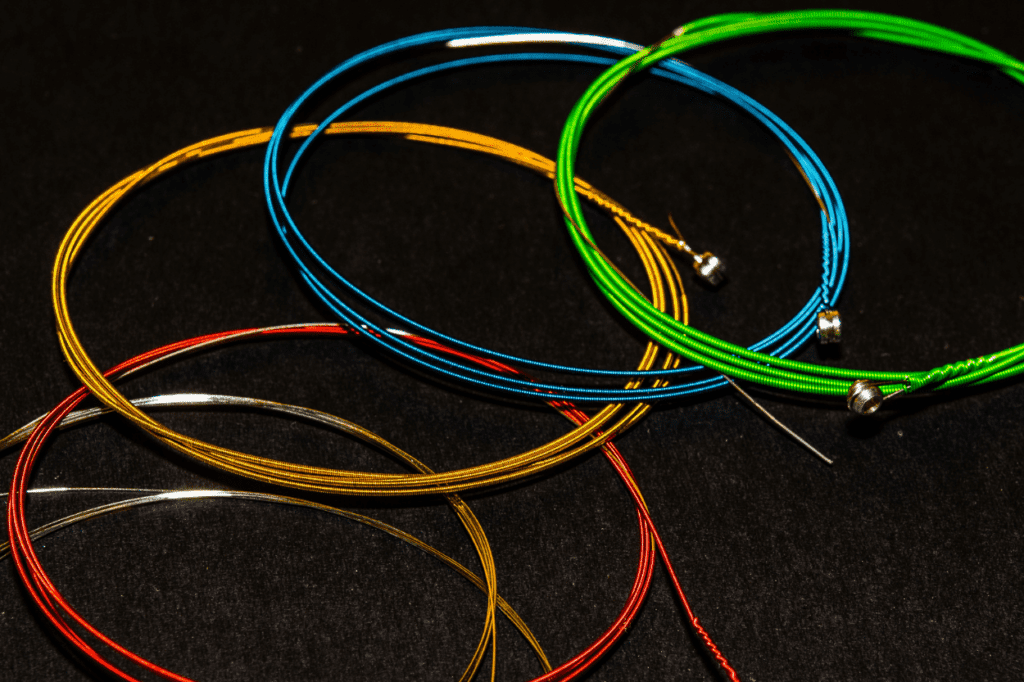
Guitar Picks
Picks are another essential accessory. There are so many different guitar picks, made of different materials, in different gauges – and every pick will sound different. Experimenting with different types of guitar picks will help you explore more tones without changing your rig.
Check out this article covering different types of guitar picks
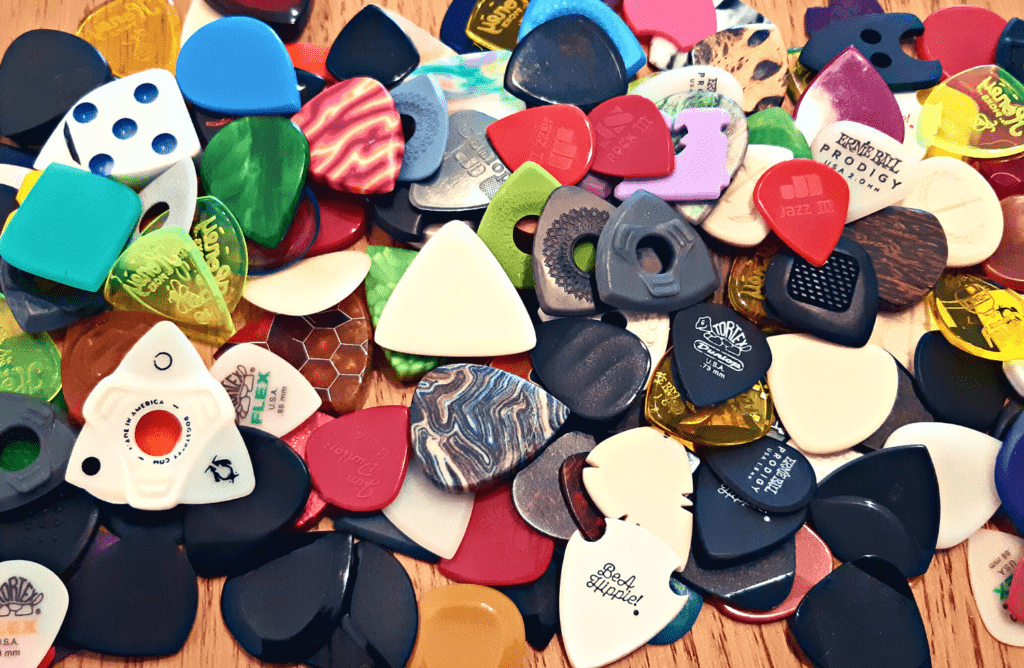
Guitar Strap
If you want to play standing up, you need a guitar strap. There are many different types of straps, but there’s one type that I wish I heard about earlier: Padded guitar straps. I love them because they relieve a lot of the pressure from the shoulders. Practically making your guitar feel like it weighs a lot less. There are a few of these on the market, but one of them stands above all the rest, and it’s this.
Because a padded guitar strap removes so much stress from your shoulders and back, I think it is very reliable for preventing guitar injuries.
Check out Lekato Padded Guitar Strap on Amazon
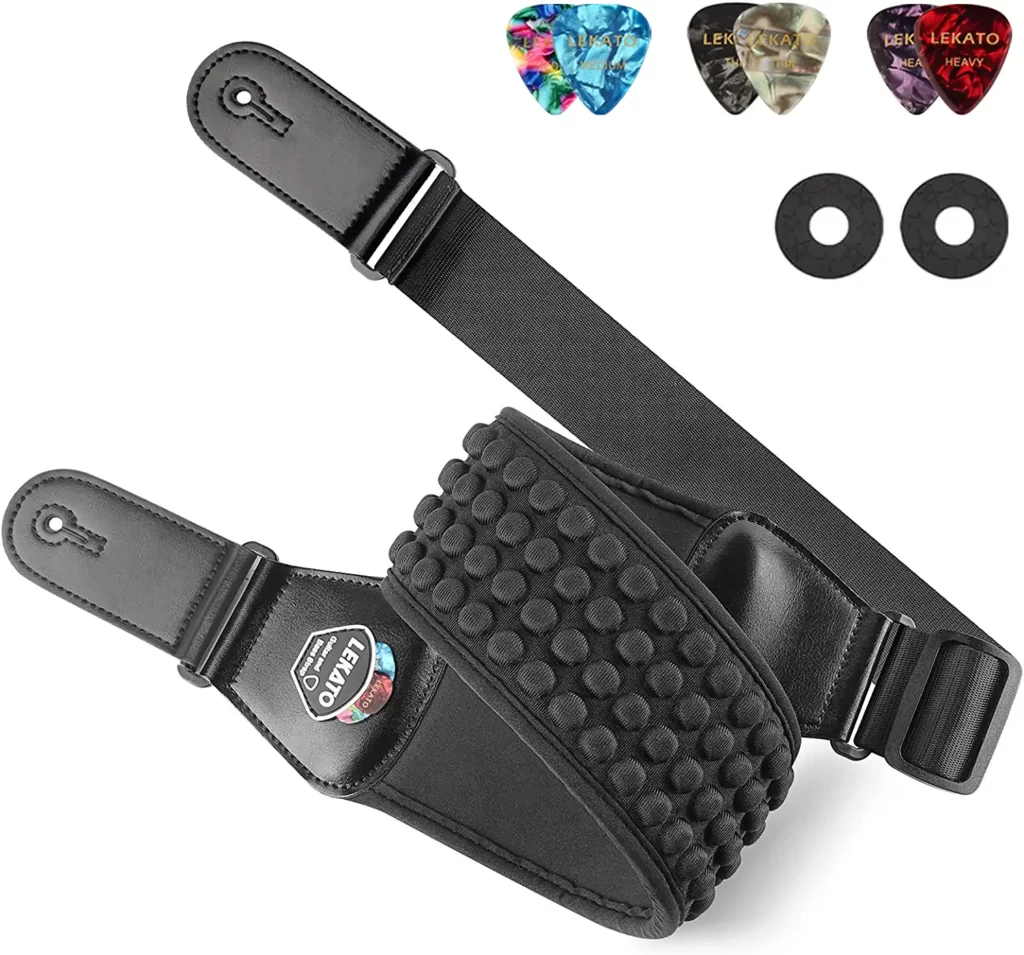
Guitar Cables
Guitar cables are one of the most important guitar accessories, and together with other types of audio cables, they are the source of one of the longest debates in history. Do cables impact tone? Unfortunately, the answer is yes. Every part of your signal chain impacts the tone. But the fact that it has an impact doesn’t mean that you need to buy an expensive cable. If you’re just starting out, you should get a simple cable, and you’ll be very happy with it. Once you start recording and adding effects, you might want to upgrade your cables to something a bit better that will help you push the signal through a longer chain. I have a few Monster Cables, and I’m very happy with them.
Check out Monster Cables on Amazon
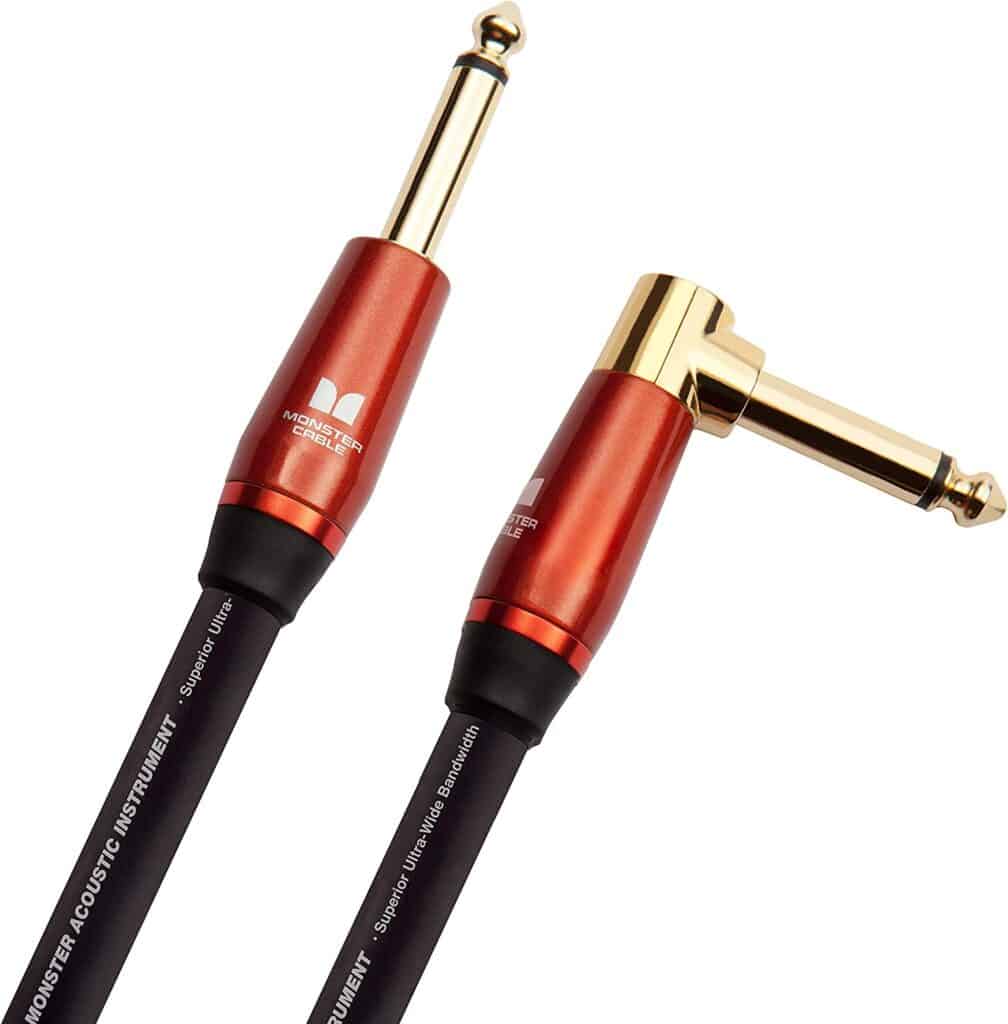
Guitar Patch Cables (Short Guitar Cables)
I know what you think. Why would you need short cables if you already have a few long ones? And I have one word for you: Pedals. If you’re just starting out, you might not need it yet, but if you started buying some pedals, some good patch cables can make your life a lot easier and save tons of space in your pedalboard. A patch cable is a short cable with two 90-degree connections (as shown in the image below). They are used to connect side mounted pedals conveniently and require a very small space.
There are many makers of patch cables. I usually use these by D’Addario, just because I trust them.
Check out D’Addario Patch Cables on Amazon
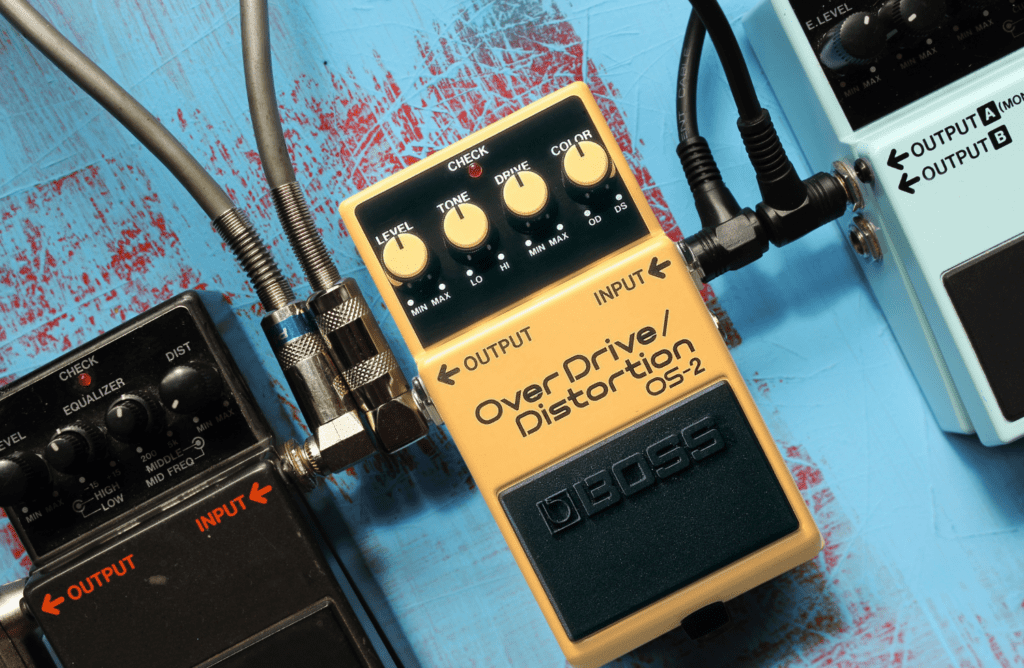
Guitar Amp
Well, duh… There are many types of guitar amps, such as tube, solid state, and a hybrid between them. Each amp will sound different, so if you don’t have one, go to a guitar store and start trying them out!
Tuner
Make yourself a habit of always starting playing after you tuned your guitar, especially when you’re just starting. This will help you get used to the sound of a tuned guitar.
There are many types of tuners. Choose the one you be the most comfortable using every day. I’m always recommending this simple headstock tuner if you’re starting out, and this for when you started getting into pedals and building your rig.
Check out KLIQ EcoTuner or BOSS TU-3 on Amazon
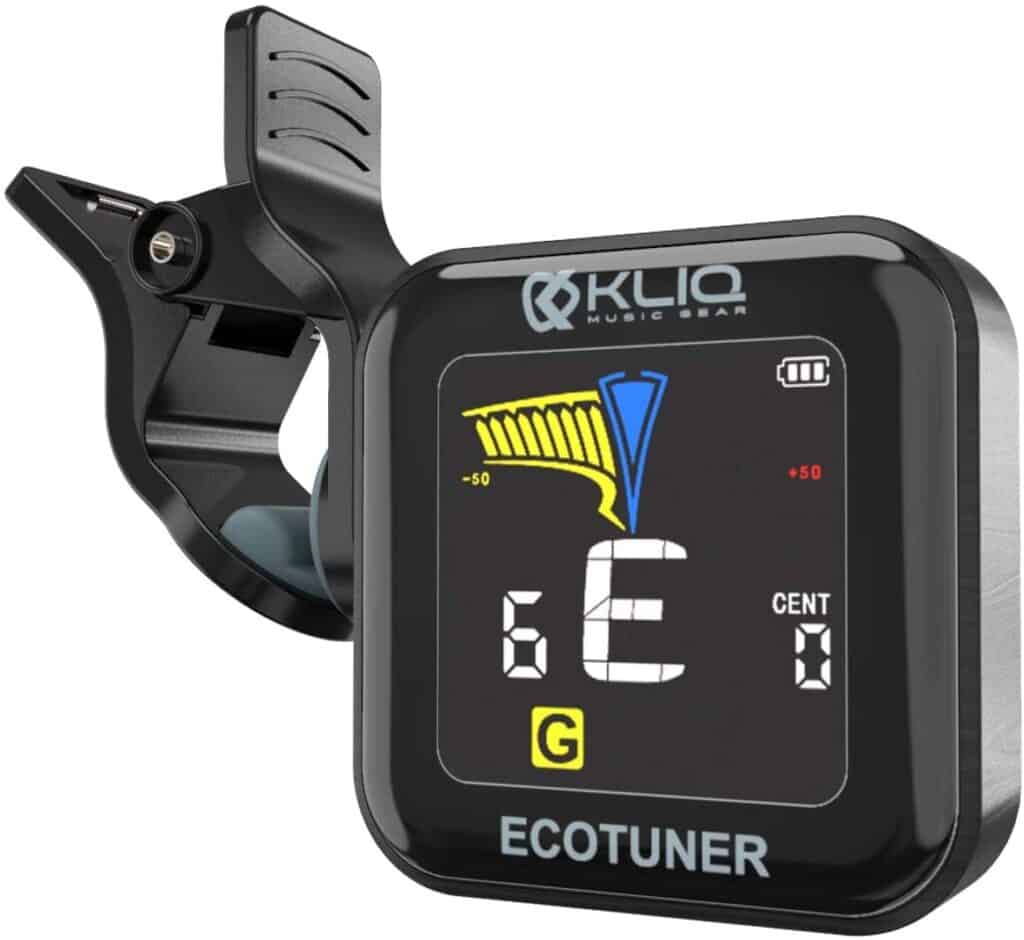
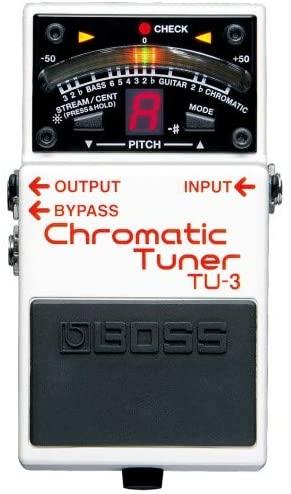
Metronome
Among all the essential guitar accessories, the metronome is the most underrated. The one I’m using is Korg TM-60, which is a handheld metronome and tuner. Before that, I used to use Soundbrenner Core (but it stopped working). If you don’t want a physical device, that’s fine. Choose a metronome that fits your practice setup. Just make sure to use a metronome.
Check out Korg TM-60 on Amazon, or read the review I wrote about it here
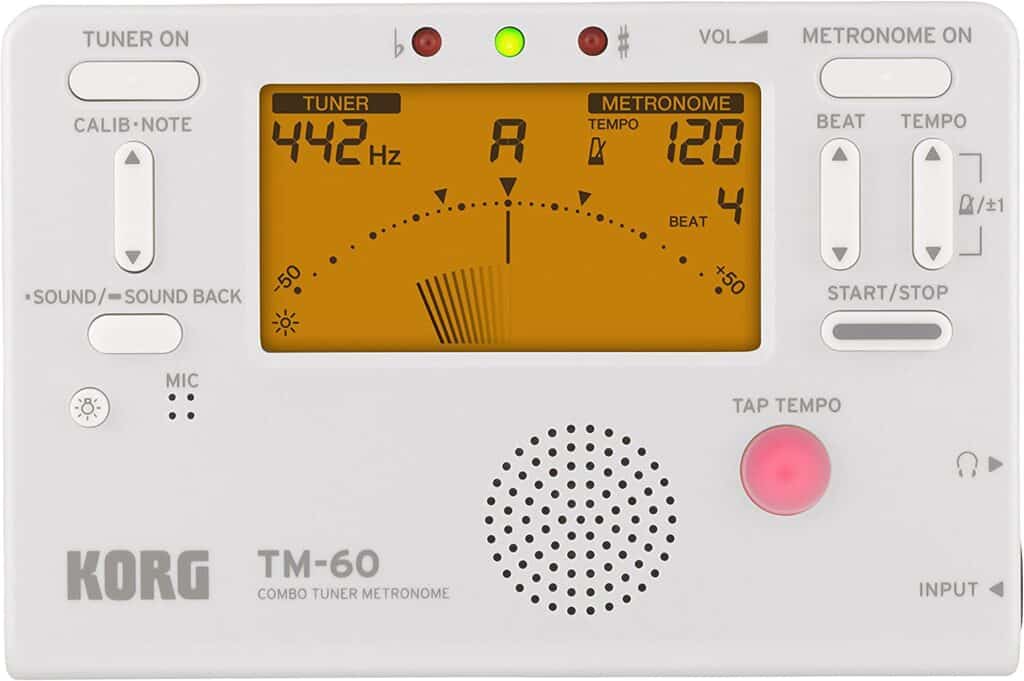
Guitar Case
If you want to carry your guitar with you somewhere, you’re gonna need a case. There are 3 main types of guitar cases, each will suit a different use.
- Soft cases (also called gigbags) are used to carry your electric guitar around. From home to band practice or a gig and back. They are somewhat protective and very comfortable.
- Hard cases are more protective but less comfortable. They are mainly used for acoustic guitars, which are more delicate than electrics. They are great for short-term storage or an alternative for soft cases for acoustics.
- Hardshell cases provide the ultimate protection for your guitar. They are usually made of wood or tough protective plastic, and have your guitar shape cut out or molded inside. The shape should fit your guitar perfectly, so you can’t really buy one for all of your guitars. They are perfect for gigging with an expensive guitar, great for traveling with a guitar, and even for storing your guitar for long periods of time, but they come at a cost.
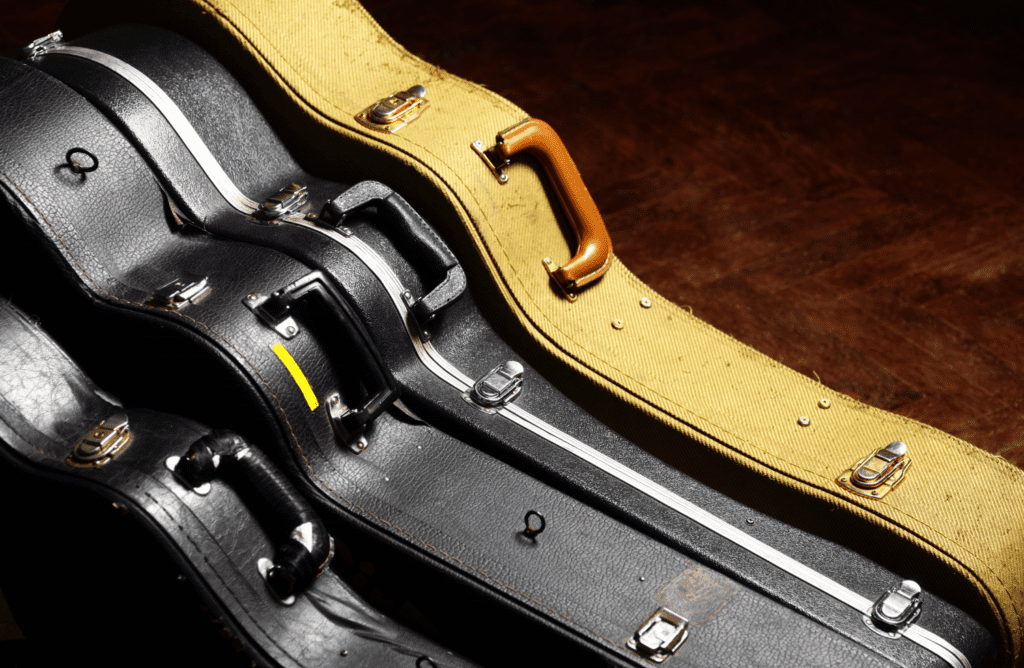
Guitar Stay
The Guitar Stay is the guitar accessory you didn’t know you needed. I got a few to try for a review, and ever since I used it, I couldn’t go back.
It prevents your guitar from slipping when you play sitting down, and it does that wonderfully.
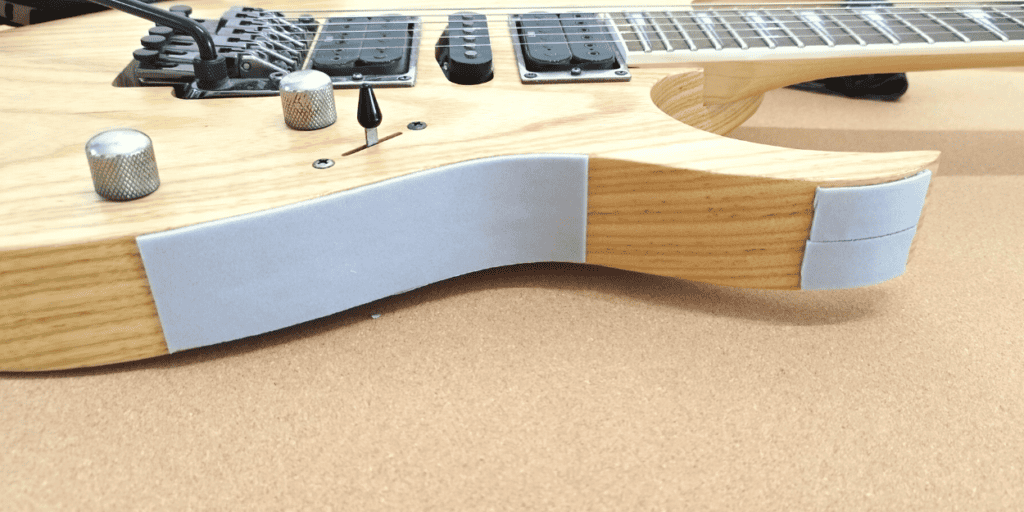
Check out Guitar Stay on Amazon
String Cutters
String cutters are guitar accessories used to cut the excess strings after to restrung your guitar. If you have a wire cutter, it will do just fine. Some string winders also come with a cutter, so bear that in mind if you need to get one.
Check out D’Addario Pro Winder (includes a cutter) on Amazon
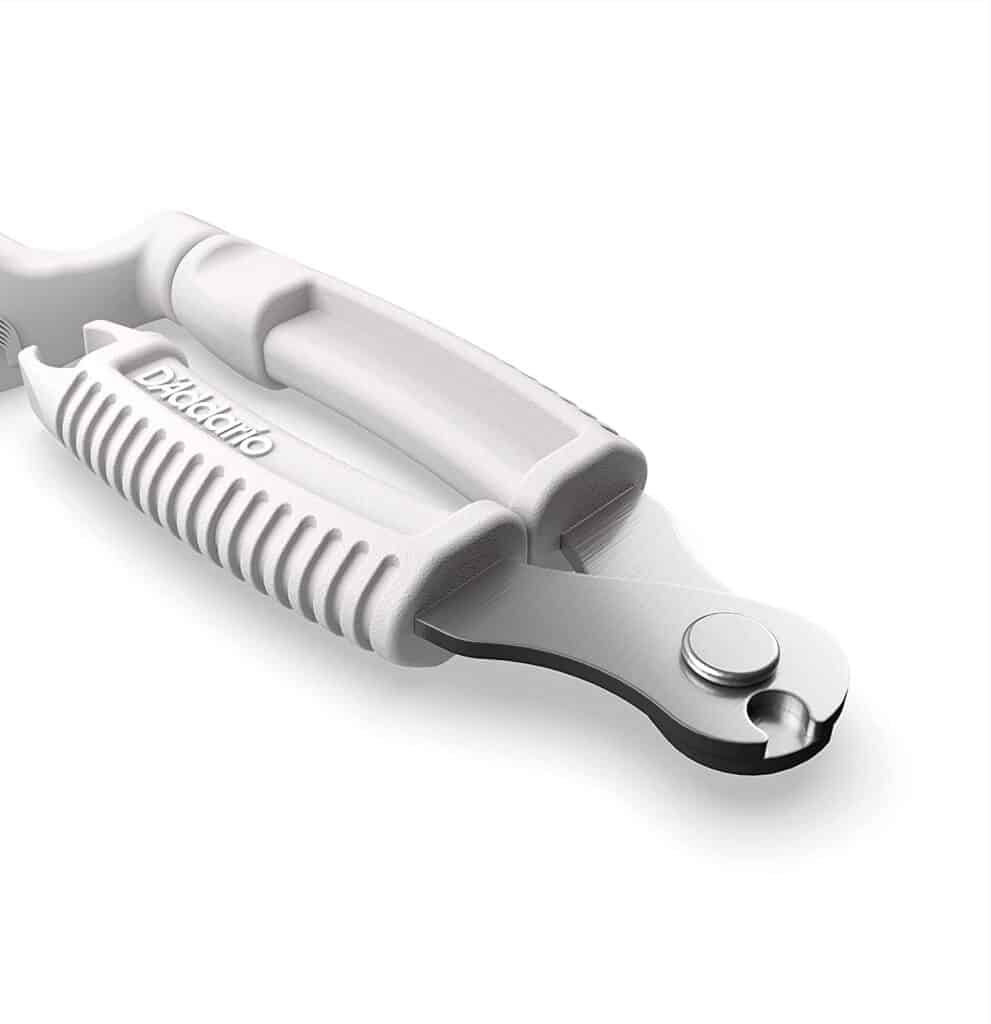
A Set Of Hex Wrenches or A Guitar Multitool
You need a hex wrench to do all sorts of things on a guitar, from adjusting the truss rod to adjusting the height of the bridge on a guitar setup. If you have a Floyd Rose bridge, you’ll need hex wrenches even for changing the strings or just tuning it.
I have a few sets of Allan keys lying around the house, but a few years ago, I picked up the MTZ-11 Guitar Multitool from Ibanez, and it became my go-to guitar tool.
Check out Ibanez MTZ-11 on Amazon or read the review I wrote about it here
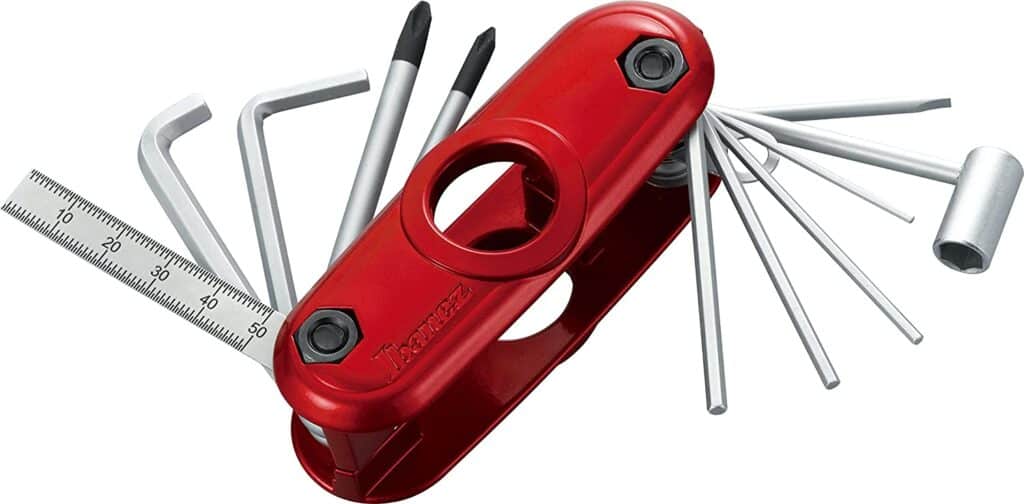
Useful Guitar Accessories That Are Nice To Have
Guitar Strap Pad
There’s his nifty guitar accessory by D’addario which is just a strap pad, that fits on any guitar strap you already have. So if you already have a strap you like, you easily make it more comfortable by adding a strap pad. Playing for a few hours can be hard on your shoulders, you probably already know that.
This great accessory by D’Addario was made to solve just that. I bought the gel one because I already have a strap padded with foam, and I find it less comfortable, but it’s just a matter of preference.
Check out D’Addario Foam or Gel Guitar Strap Pads on Amazon

Guitar Stand
Guitar stands are vital if you want to keep your guitar accessible and safe at the same time. Even though a guitar stand is a fairly simple product, some of them are quite expensive. Especially those that fit multiple guitars. If you have just one guitar, all you need is a simple, well-built one. Before I mounted all of my guitars on the wall, I had about 7 of these.
Another cool one is Guitar Dock by D’Addario, which is (at least to me) a temporary guitar holder. I have a few of these around the house, and I hang my guitars there instead of laying them against the wall or a desk.
Check out GLEAM Guitar Stand on Amazon
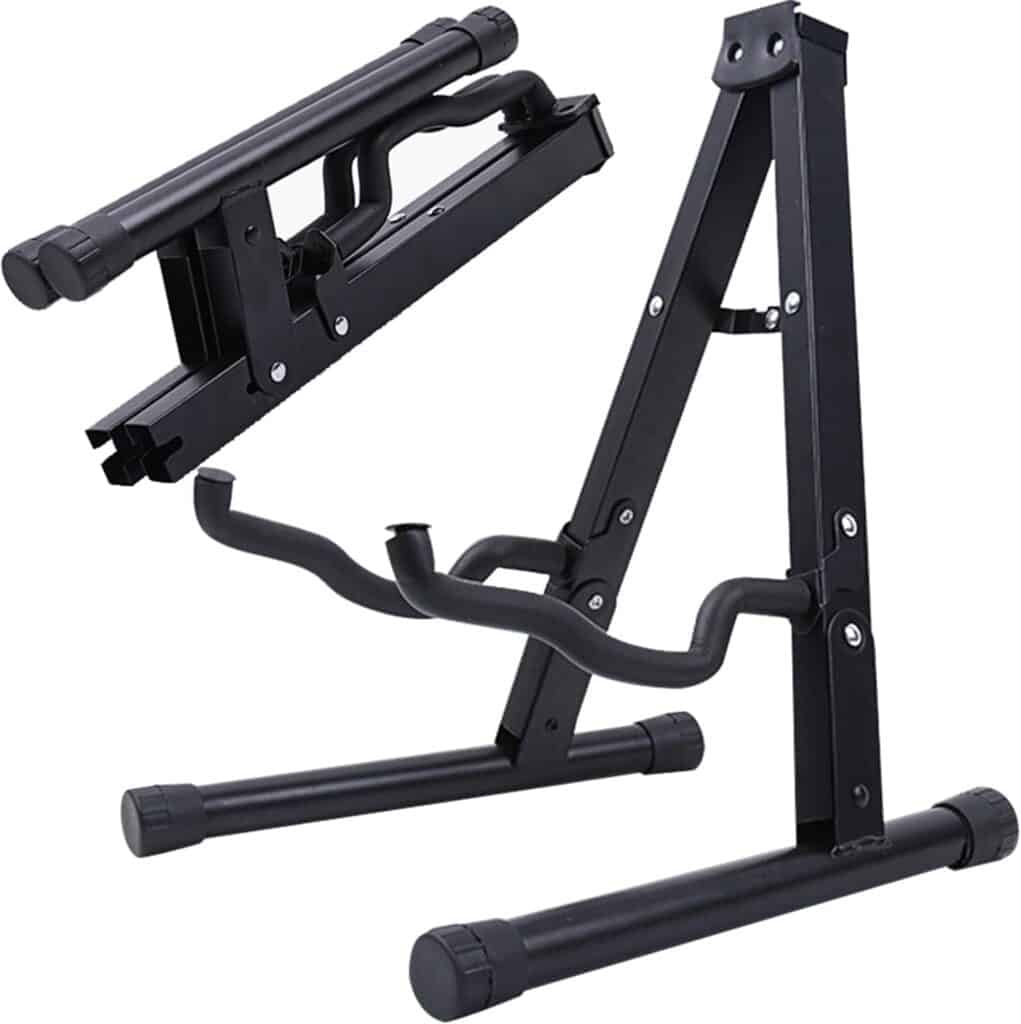
Guitar Pick Grips
If you tend to drop your picks when you play, this might just solve your problem. We have gone a long way since having guitar players glue sandpaper to their picks. Today, there are countless different designs for pick grips, and they are made of anything from rubber to cork. Monster Grips is a great example of a rubber grip, and Mr. Power’s Cork Grip is a great example of a grip made of Cork.
Check out Monster Grips and Mr. Power’s Cork Grip on Amazon
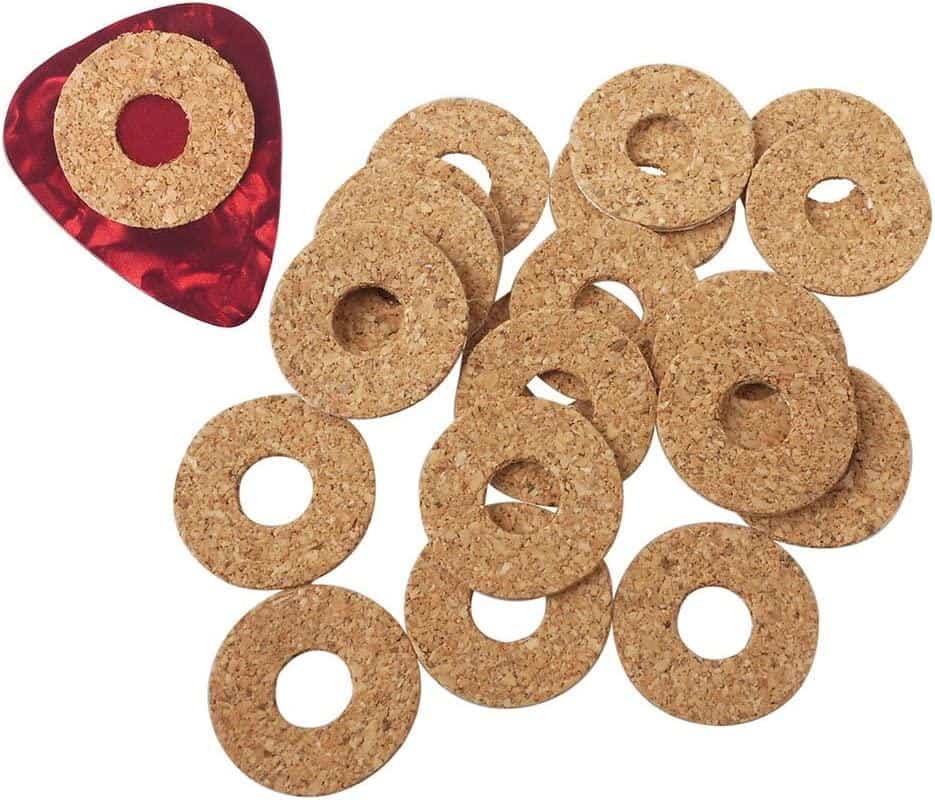
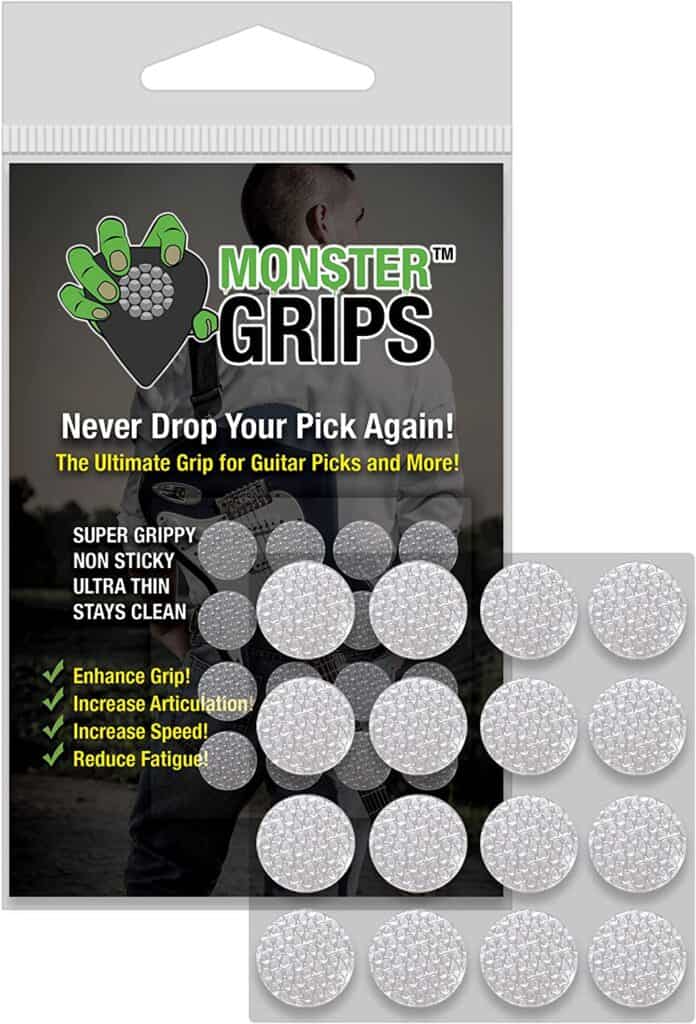
Guitar Transmitter
A guitar transmitter, in a way, is a comfortable alternative to a guitar cable. The reason I’m using this one and not one of its alternatives is that the signal doesn’t break and its range is pretty big. I use a transmitter when I gig and don’t want cables everywhere. Transmitters reduce the quality of the signal (a tint bit) in exchange for comfort, and that’s why I don’t use them for recordings.
Guitar transmitters work on either 2.4Ghz or 5.8Ghz frequency. I found the 5.8Ghz to be a little more reliable, and the one I’m using is Getaria Wireless Guitar Transmitter because it’s reliable, affordable, and doesn’t look like a cheap toy.
Check out Getaria Wireless Guitar Transmitter on Amazon
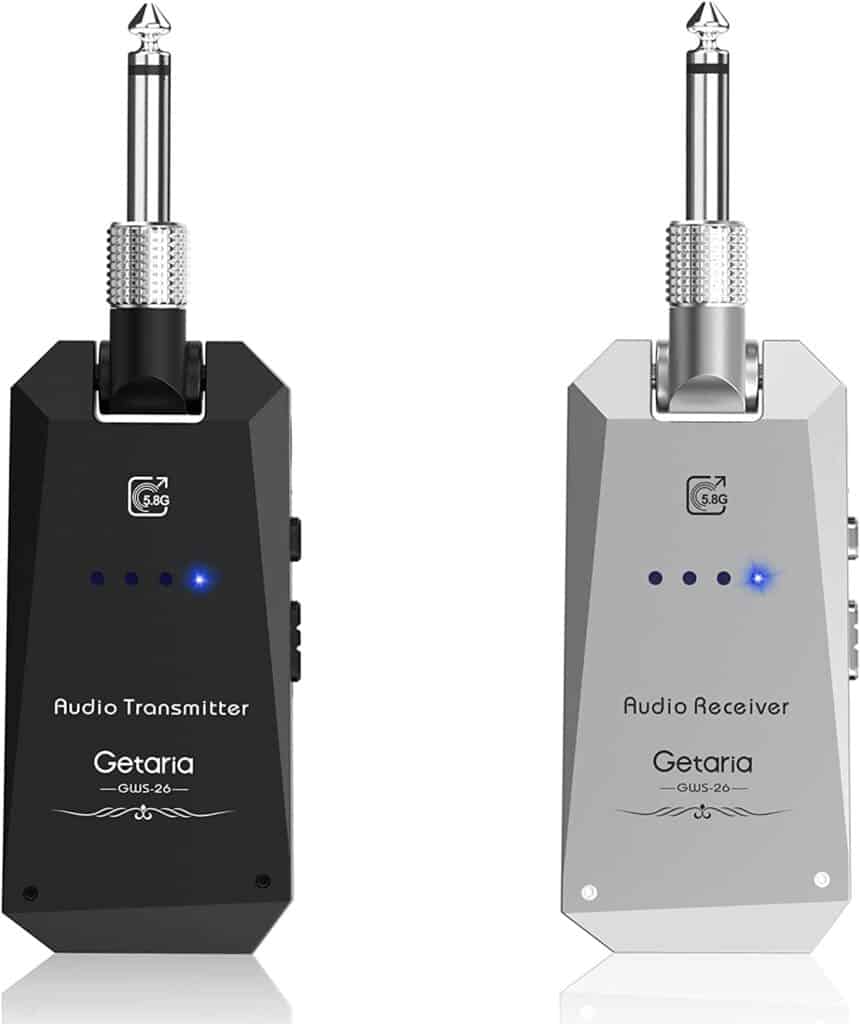
Strings Dampener / FretWrap
Fret Wraps (sometimes called nut wraps or string dampeners) have become one of the most common guitar accessories in the last few years, and it’s as if they came out of nowhere. Don’t get me wrong – I’m not complaining. String Dampeners help a lot with silencing strings that are not being used, making sure you have as few additional sympathetic resonances from other strings as possible.
There are many manufacturers of string dampeners, but when I think about Fret Wraps, I think of one brand in particular – Gruv Gear. Since they don’t wear or become less effective over time, they are a great investment in the clarity of your playing.
They come in 4 sizes: SM / MD / LG / XL. SM fits 6 string acoustics and electrics, and 4 string basses. MD fits classical guitars, 5 string basses and 7 string acoustics. LG fits 6 string basses ot 8 strings electrics. And XL fits basses with 7 to 12 strings, Chapman sticks, and electrics with 9 strings and up.
Check out Gruv Gear FretWrap on Amazon
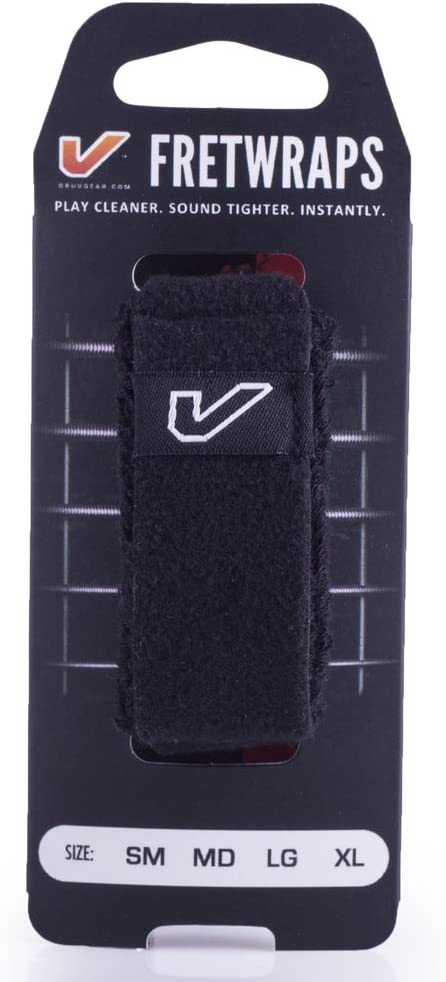
FretWedge
If you have never heard of it, a FretWedge does to the part of the strings on the headstock what Fret Wraps do beyond the nut. It eliminates most of your strings’ noise and movement over the headstock.
It’s a nice complementary to Fret Wraps, but their impact is minimal compared to them. And they’re a lot cheaper, too.
Check out Gruv Gear FretWedge on Amazon
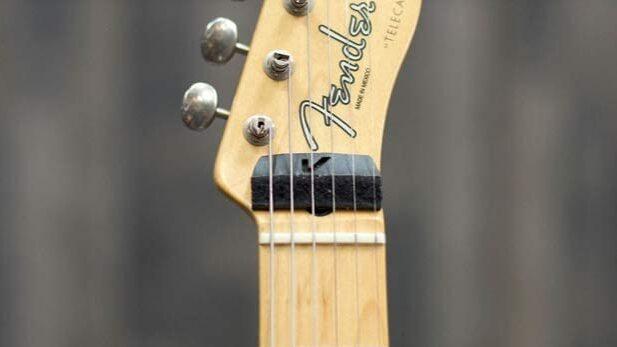
Strap Locks
There are a few different types of strap locks. The simple ones are called Clip strap locks and are made by many companies, including Guitar Savers and D’Addario, and by some small and boutique makers such as Rombo and Osiris Accessories. The more advanced ones are called Strap-Fitted Strap Locks. They are, too made by a lot of companies (such as D’Addario, Ernie Ball, Fender, Stagg, and more…), which are great. But there’s only one that I feel comfortable vouching for: Schaller S Locks, which is just on a level of its own and was also featured in my guitar mods article.
Check out Schaller S Locks on Amazon
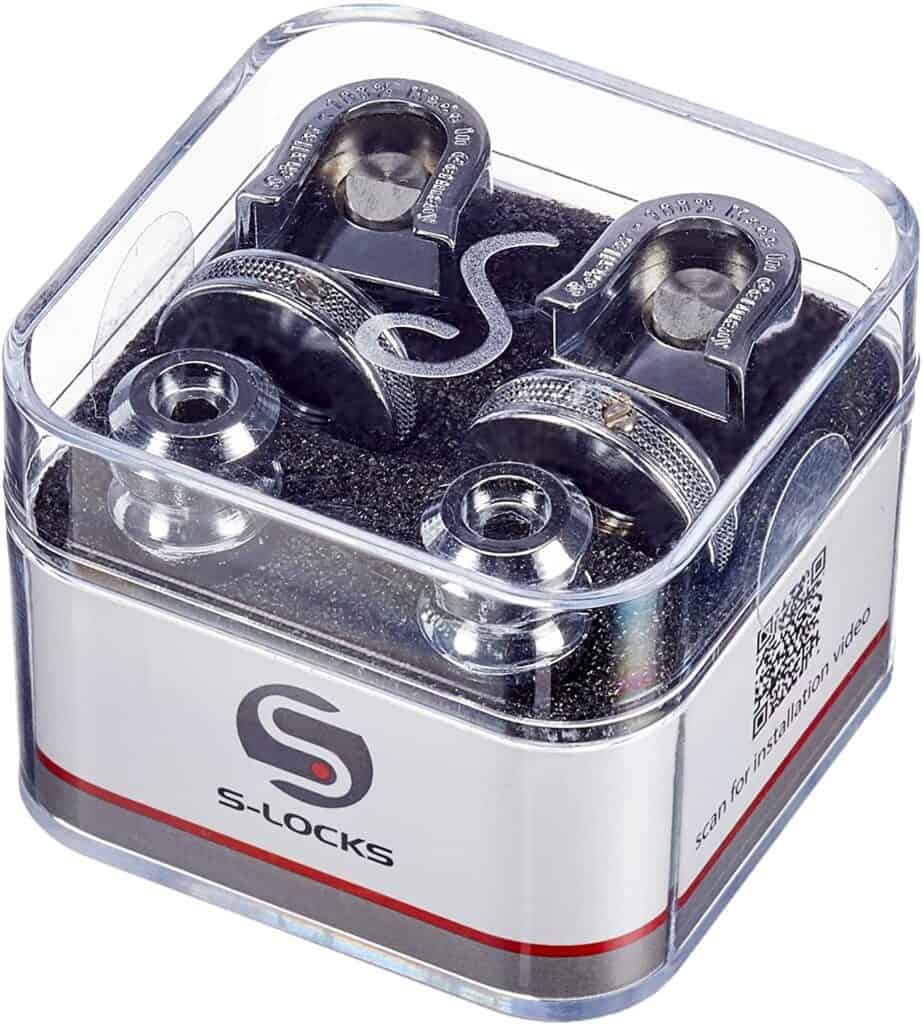
Slide
There are many different types of guitar slides. The majority of them are made of metal, but some slides are made of glass and clay. My problem with most slides is their lack of sustain. This slide, made by Black Mountain Picks, solved the problem for me. It has a lot of additional weight that makes it both more comfortable and accurate, and sustain a note for a lot longer.
Check out Black Mountain’s Slide on Amazon, or read my review about Black Mountain thumb picks and slide rings here.
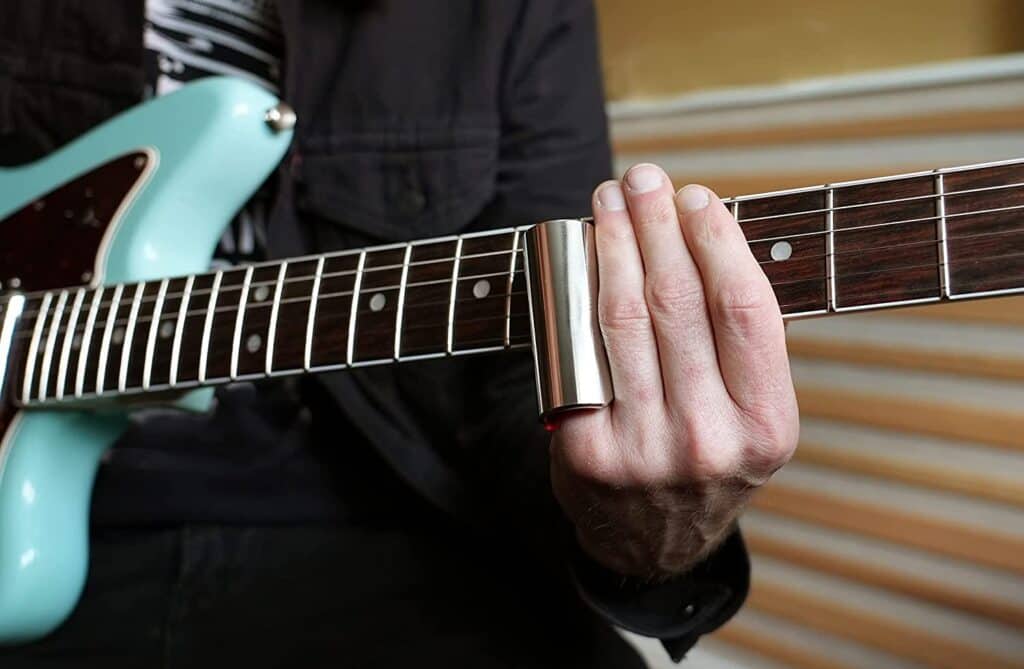
Capo
A capo will help you play songs in different keys easily. You can place this guitar accessory anywhere on the neck of your guitar. This allows you to play new songs with the chord shapes you already know. There are some expensive ones, but you can also get them for really cheap. At the end of the day, they all work very similarly and will get you roughly the same result. I use a capo made by Thalia because I found it very comfortable, but again, any capo would work.
In some situations, such as during a guitar setup, you might need 2 capos, so if you plan on starting to maintain your own guitar, this is something to bear in mind.
Check out Thalia Capos on their website
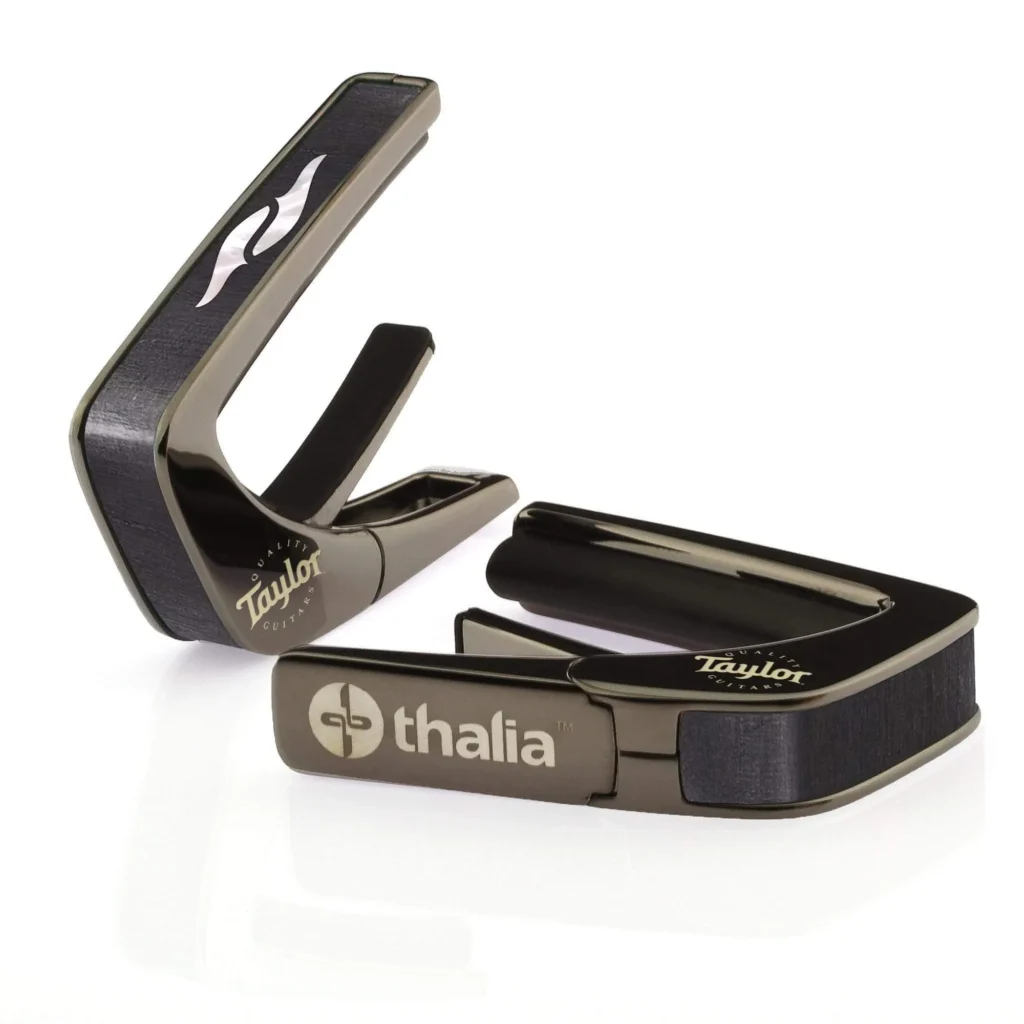
String Winder
The ultimate time saver for changing strings. There’s not much difference between different string winders, so if this is all you need then to do, just get the cheapest ones. I got mine from D’Addario because it includes a winder, string cutter, and bridge pin puller.
Check out D’Addario Pro Winder on Amazon
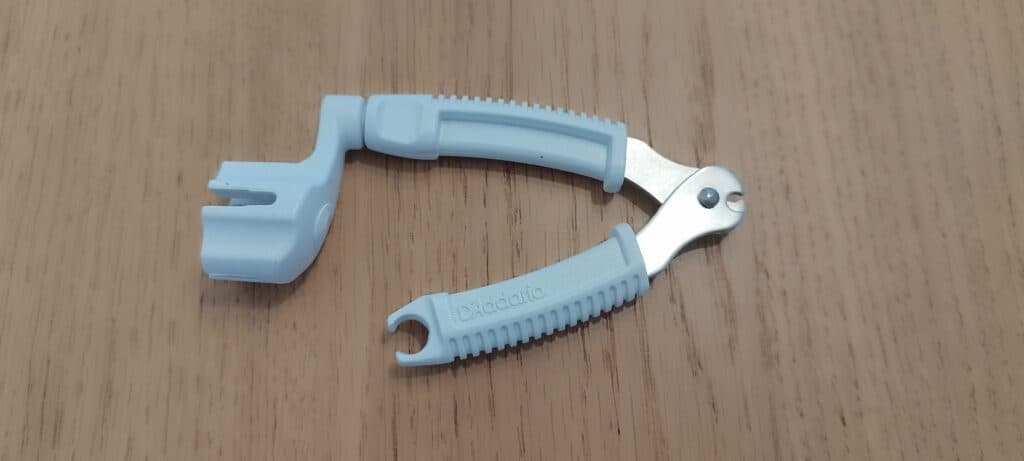
Guitar String Cleaner
Cleaning guitar strings can take a few minutes every time you do it. A cool accessory that helps save time with that is The String Cleaner by ToneGear. There are many other alternatives to it, and they are all essentially the same. I’m recommending this one just because that’s the one I’m using.
Check out The String Cleaner by ToneGear on Amazon
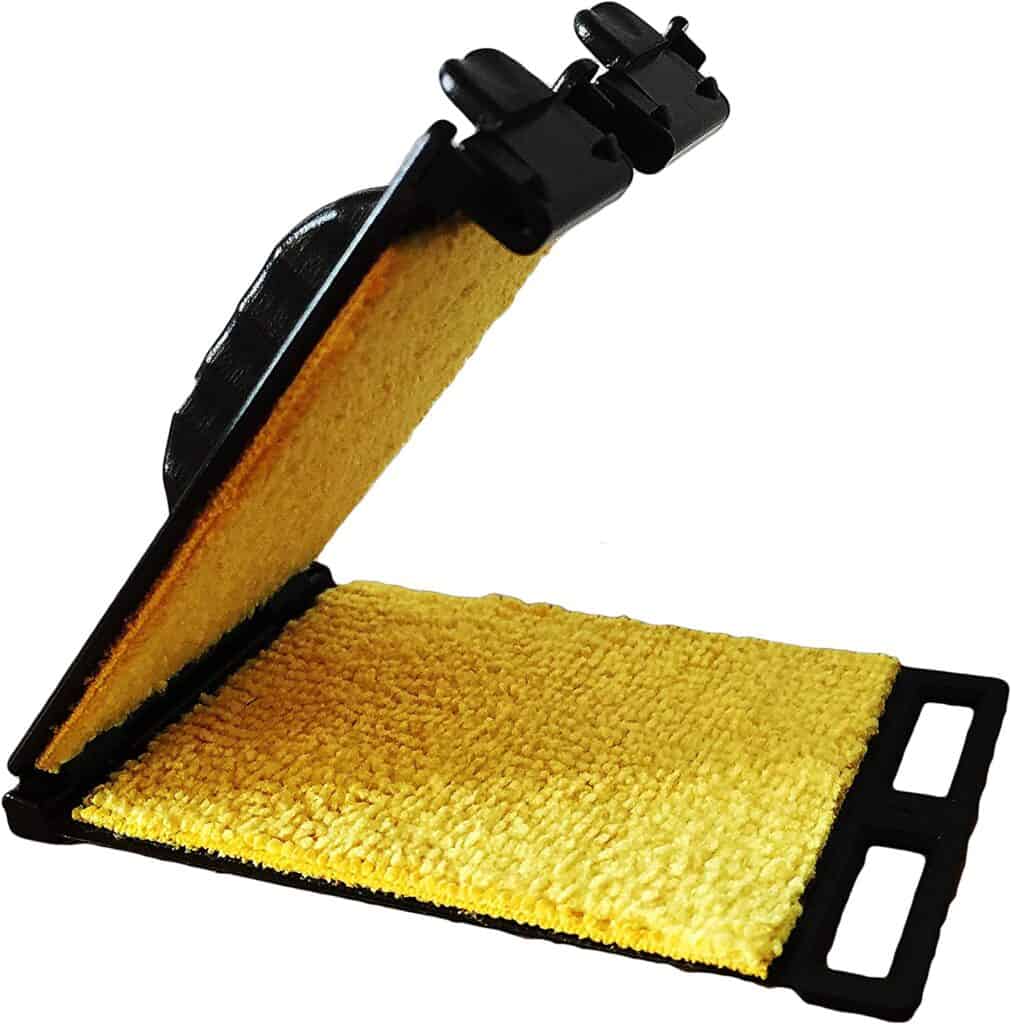
Acoustic Guitar Humidifier
Wood responds to changes in humidity. Maintaining the humidity levels in your guitar is very important to prevent cracks and to keep it in good condition. If you plan on storing your guitar in a case for a long time or traveling to a place with a different climate, a humidifier is an absolute necessity.
I’m using this one by D’Addario for ongoing humification. When I travel with a guitar or put a guitar in storage, I insert some of these Humidipacks into the case and soundhole, to balance the humidity level in the guitar. There’s another new one I’m curious about called Vertigo by Prolix that I’m eager to try.
Check out D’Addario Guitar Humidifier and Humidipacks on Amazon
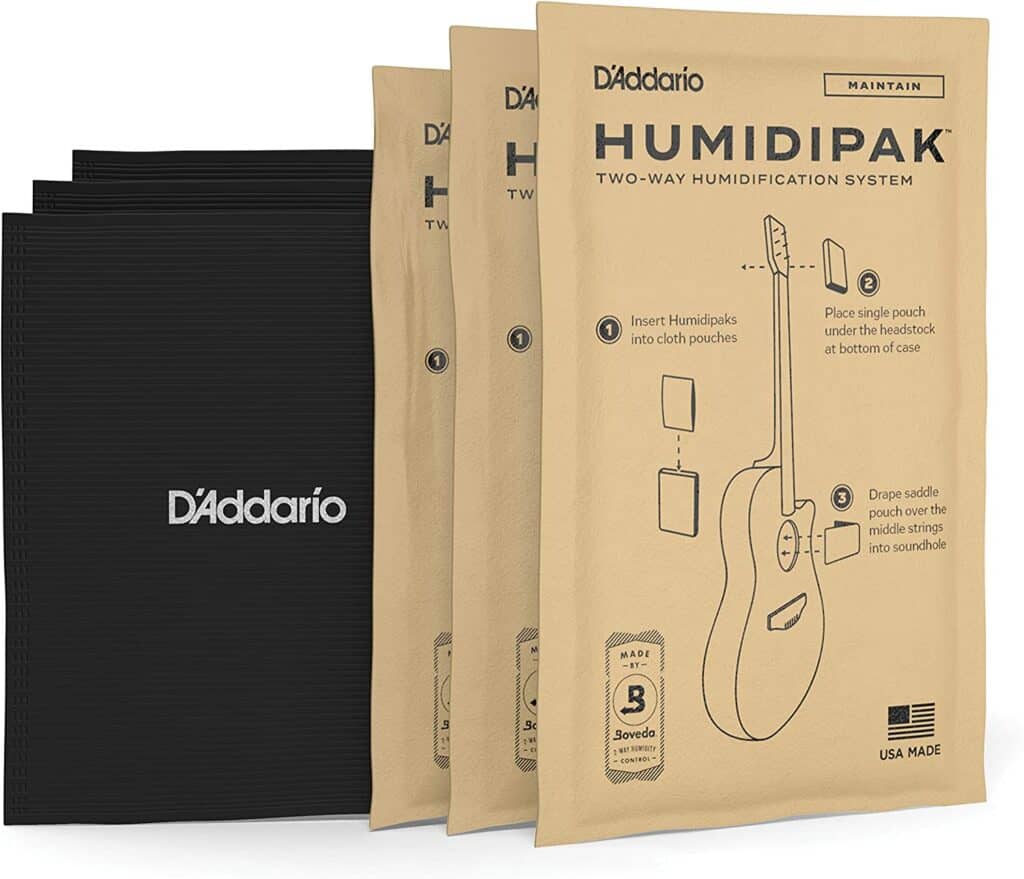
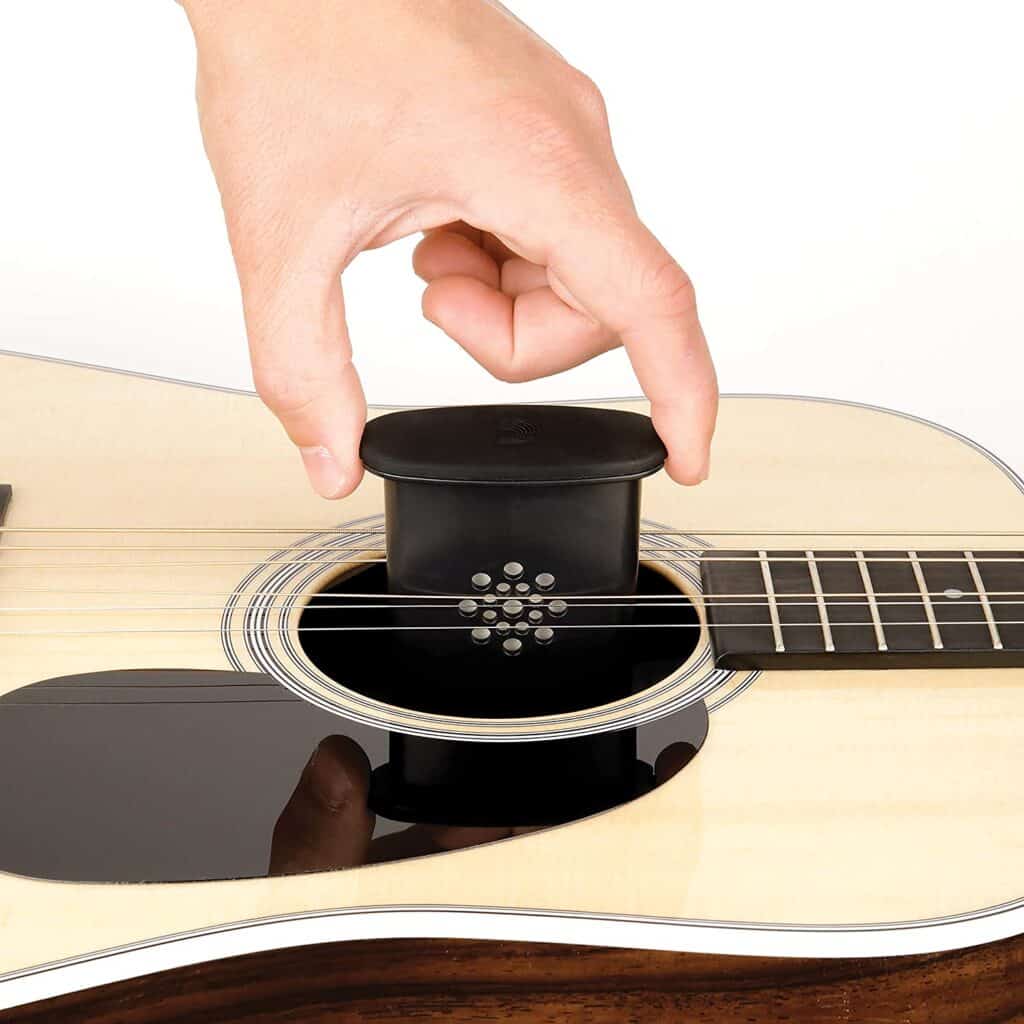
A Pedalboard
If you started to get serious and buy a few guitar pedals, a good idea would be to invest in a good pedalboard. There are a few good options for a pedalboard that will serve you for years. One of them is D’Addario XPND, which, as its name suggests, is expanding so it’ll fit even when you buy more pedals down the road.
Another option is Pedaltrain, which makes my favorite pedalboards. Each comes with a lifetime guarantee. Its build quality is superb, and it will last a lot longer than XPND because it has no moving parts at all.
Check out D’Addario XPND (one or two rows) on Amazon, or read the review I wrote about Pedaltrain’s entire collection.
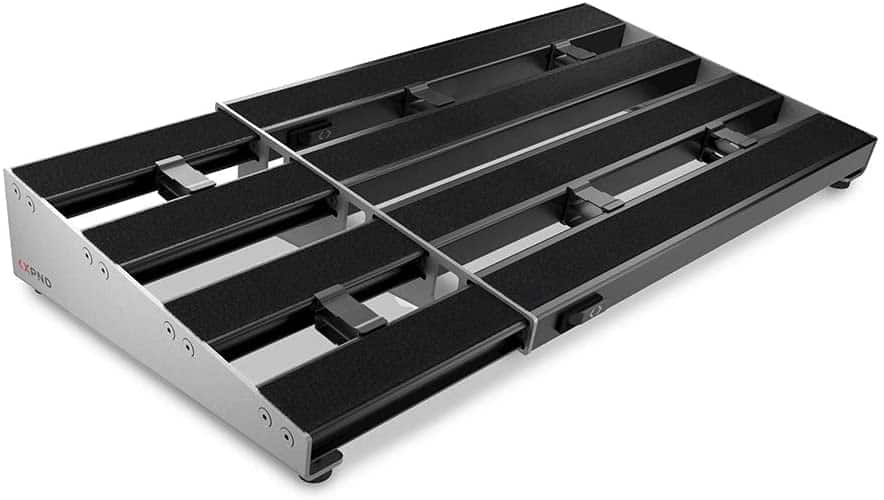
Bridge Pin Puller
A bridge pin puller is essential for changing strings on an acoustic guitar. There are many available, and they are all essentially the same. I have two pullers that work a bit differently from each other. There’s the one that comes with D’Addario’s winder, and another one (which is pretty innovative, in my opinion) called Snapz by BigRock Innovations.
Check out Snapz by BigRock Innovations on Amazon
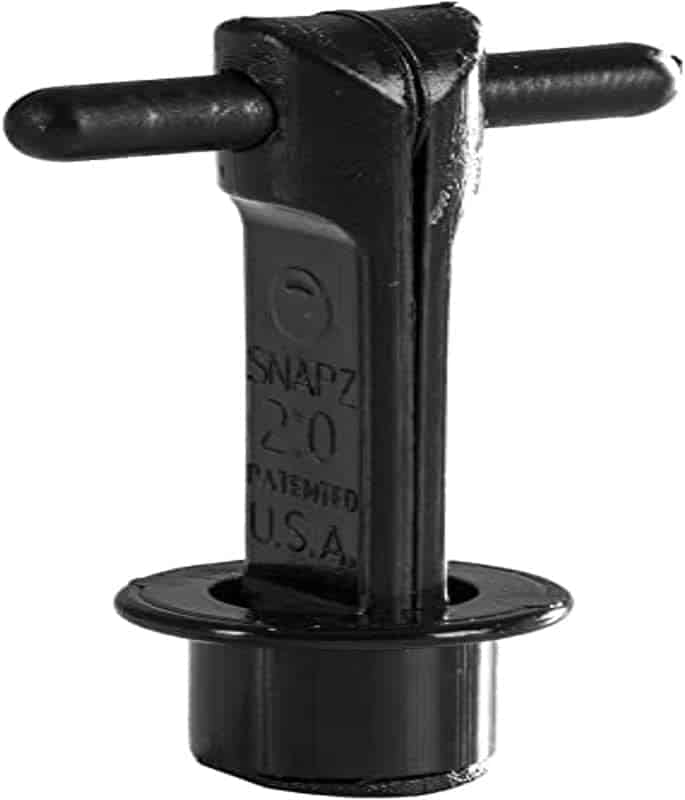
Guitar Knob Puller
As weird as it may sound, a guitar knob puller is important if you want to pull out your guitar knobs without scratching the guitar finish or pickguard. Some situations where you want to remove your knobs are if you want to upgrade them or if they are noisy and you want to fix them.
The puller I like is made, too, by BigRock Innovations. It grabs the knob on both sides from beneath and lets you effortlessly pull it out.
Check out BigRock Innovation’s Knob Puller on Amazon
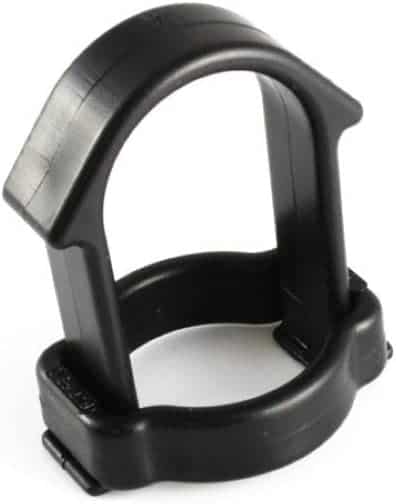
Guitar Finger Exercises
This topic is a bit controversial. Some think it’s useless, and some swear it helped them a lot. Most guitar exercise tools are made to help with one of two issues: Finger strength or flexibility. There’s one by D’Addario that looks like the buttons of a french horn, which is quite famous because it does what it says on the tin. But I don’t think that finger strength is a problem too many guitar players have. Most of the time, when someone thinks they have a finger strength problem, they actually have a coordination problem, which is solvable by some tool-free exercises.
Pick Holder
Some straps come with a pick holder, but if yours isn’t (or even if it does, but the position is uncomfortable), consider buying a pick holder. There are many types and designs. Some fit on a mic stand, some fit on the headstock, and some stick to the guitar body.
An example of a mic stand pick holder is this one by Gator Frameworks. It fits on a mic stand (well.. duh..) and can hold up to 12 picks, which are more than enough to last a full gig, even if you’re the biggest pick dropper the world has ever seen.
One pick holder, by Rombo Picks, can hold 2 picks and fits on the headstock. And Oks Picks came up with a clever design called Pick Taco. It will fit three regular picks or one extra thick guitar pick.
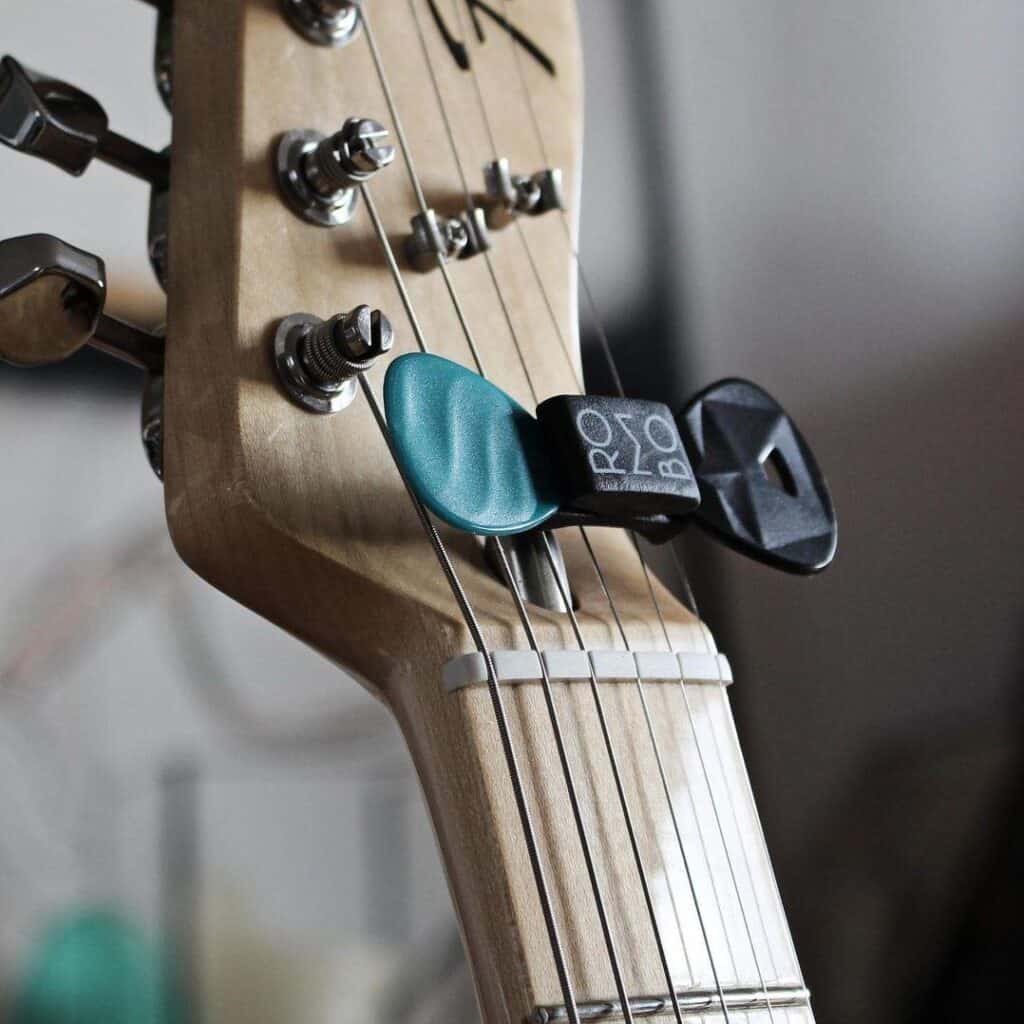
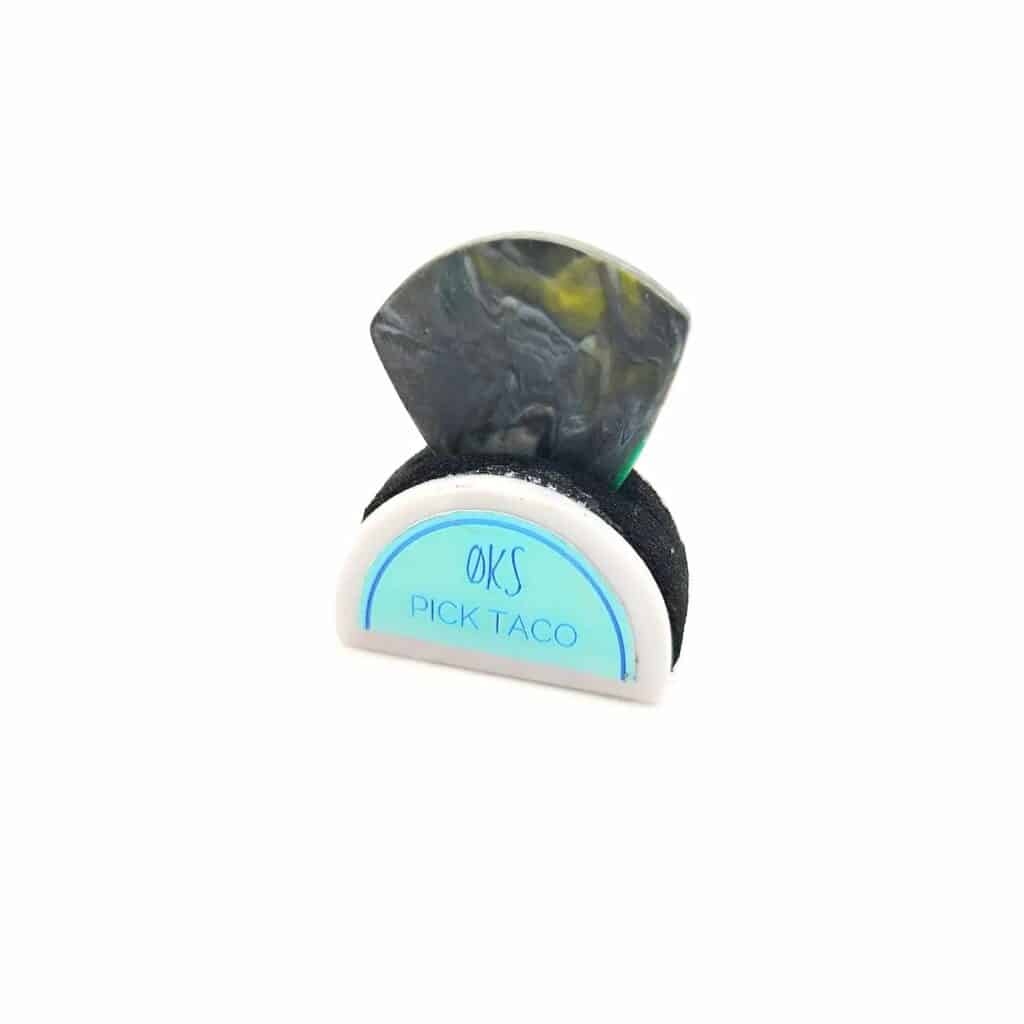
Tremolo Arm Tension Springs
If you have a Strat, or an S-type guitar, you probably have noticed that your tremolo arm is awfully wobbly. Well, no more! Just remove the tremolo arm, put one of these springs inside the tremolo arm hole and screw it back in. Voila!
Check out Fender’s Tremolo Arm Tension Springs on Amazon
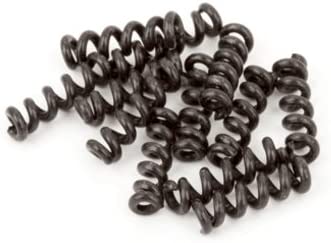
Finishing Thoughts
Some guitar accessories are nice to have, but most of them are essential to playing and maintaining your guitar. If you think I forgot some, feel free to post them in the comments below, and I’ll add them.
Loved the list, thanks!